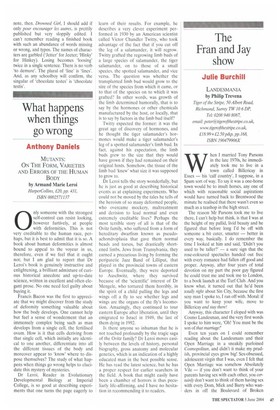Seduced by the scent of a mystery
Sam Leith
VISITS FROM THE DROWNED GIRL by Steven Sherrill Canongate, £10.99, pp. 329, ISBN 1841955094 \/isits from the Drowned Girl starts out with a gripping idea as old as crime fiction: the bystander. Benny Poteat climbs communications masts for a living. One day, from the top of such a mast out in the backcountry. he looks down and sees a girl set up a video-camera on a tripod by the side of a river. The girl, as he watches, powerless to intervene, takes off all her clothes in front of the camera, walks unhesitatingly into the rushing floodwater, and disappears from sight.
When Benny climbs down the mast and reaches the site of her suicide, he finds alongside her clothes a rucksack full of videotapes, and a business card. He knows he should call the police. But somehow he doesn't. Instead, he takes the videos home and starts his own investigations. Benny is seduced by the ownership of a secret, by the scent of a mystery. And so is the reader.
The setting is the same hick America of Sherrill's previous novel, The Minotaur Takes a Cigarette Break — indeed, that novel's used-car seller Sweeny and its drive-in porno cinema both make welcome reappearances — but under surface similarities this is a rather different book.
That one of the novel's resources is a flea market is appropriate. Sherrill is not afraid of clutter. There's a superabundance of detail; a barrage of willed quirkiness that, particularly in the first half of the book, risks giving the impression that the props department for five unmade David Lynch films has simply been emptied over a trailer park in the American south.
We come across two characters with coins stuck, for no apparent reason, in their ears; we pass by the roadside a man shooting a turtle; there's an aquarium in an old school bus; there are midgets and monopedes; a child is conceived when a tornado blows a woman out of her bath and onto the erect penis of the man next door.
This stuff may irritate, and it may endear. Minotaur benefited from being more tethered to the quotidian (once you get over the fact that its lead character is an immortal half-man, half-bull demigod). But it isn't there by accident.
Steven Sherrill is a poet. and writes like one both at the level of the sentence and in the way he patterns his narrative. There are countless recurrences and parallels, and they are the more effective for being allowed to breathe without insistence on meaning: orphaned animals, blowjobs, repeated misfortunes involving policemen and feet, tornadoes, gang rape and, inevitably, fish. When the narrator insists at one point that 'coincidence, that sublime trickster', is guiding events, you have to laugh at the sheer bloody cheek of him.
Sherrill's enthusiasm for assonance produces the odd poeticism you could live without (minnows dithered and flitted in the river's spill' is a darling that, to my ear, wants killing); and he can be seduced into long, dreamy sentences laden with subclauses. But the dialogue is snappy and often very funny, particularly that involving the sex-crazed retard Dink, or Benny's ongoing flirtation with the neighbour-lady, Doodle.
Also, the tension between form and style is at the centre of how this novel, when it works, works. Its premise, intriguing as any locked-room set-up, promises a sort of thriller. But what it delivers is a moral thriller, if that term makes sense, and one whose eventual ferocity really has the power to startle.
As time goes on, as Benny finds out more about the drowned girl and becomes more closely involved with her unsuspecting sister, the scale of what his secret has done to him becomes clear. You think of Gollum and the Ring. The narrative, earlier on seeded with light-footed references to Esther and Job, becomes darker and nastier than you anticipate. It is not too much to say that it is the story of a secular damnation.
Sherrill's description of the way a private guilt can turn outwards and become spite — his patient notorisat ion of the cycle whereby shame begets shamefulness — is pitiless and without condemnation. The camera that records his absent heroine's suicide is like a proxy: 'With infinite patience, it captured, chronicled, without judgment, the life that passed before it ...'
As in his previous novel, Sherrill manages the transitions between farce and seriousness deftly. It's quite an achievement to make horrifying, rather than comic, a scene in which a man lets his midget girlfriend be raped by goats in a petting zoo. This is a deeply strange book (Sherrill doesn't so much plough his own furrow as work in a different field), but is finally, I think, a very successful one.
I wish I didn't have to end on a petty note, then. Drowned Girl, I should add if only pour encourager les autres, is prettily published but very sloppily edited. I can't remember reading a finished book with such an abundance of words missing or wrong, and typos. The names of characters are garbled (Jetter' for Jeeter; `Hinky' for Hinkey). Losing becomes 'loosing' twice in a single sentence. There is no verb 'to demure'. The plural of 'line' is 'lines'. And, as any schoolboy will confirm, the singular of 'chocolate testes' is 'chocolate testis'.











































































 Previous page
Previous page